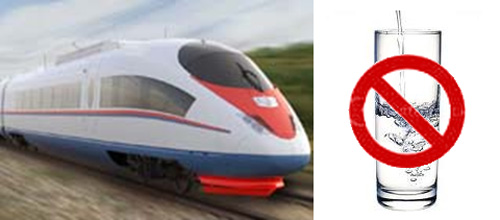 (This is a guest post by John Helmer from Dances With Bears.)
(This is a guest post by John Helmer from Dances With Bears.)
The Evraz Group, Russia largest steelmaker, has started a $440 million project to reconstruct the Novokuznetsk Metallurgical Combine (NKMK) mill to produce 25-metre and 100-metre rails for high-speed railway lines being built in Russia.
A company announcement says the new mill at Novokuznetsk city, in the Kemerovo region, will be commissioned in 2012, and will have production capacity for about one million tonnes of high-speed rails, including 450,000 tonnes of the 100-m type. At present, this type is not produced in Russia. According to Evraz, reconstruction of NKMK will involve a new automatic rail-rolling line, as well as rail hardening and straightening equipment to bring the product up to the quality standard of imports.
The state-owned Russian Railways company will buy most of the product for new fast and high-speed rail projects. In June 2008, Prime Minister Vladimir Putin signed the government’s special “Strategy for Developing Rail Transport to 2030”. The novelty is the construction of fast (up to 160km/hr) and high-speed (up 350km/hr) passenger rail travel. The first high-speed line will open next year between Helsinki and St. Petersburg. The connexion to Moscow will follow after that.
The fast-speed rail service known as Sapsan started operating between Moscow and St. Petersburg last December. Other priority fast and high-speed lines in the plan, according to a Russian Railways release, are Moscow to Smolensk in the west, and Moscow to Nizhy Novgorod in the east. As the Russian Railways map shows, Novokuznetsk is to be linked by fast line to five other cities in central Siberia.

The hefty new investment in what has been, until now, the most obsolete of Evraz’s three steelmills in Russia — the other two mills are Nizhny Tagil and Zapsib — does not include the Rb2.4 billion ($80 million) cost of a new waste-water treament system. This had been accepted by Evraz in 2006 to comply with Kemerovo regional court, and federal regulatory agency orders. Pollution from both NKMK and Zapsib has been flowing into the river serving drinking water for the city of Novokuznetsk, the regulator and the courts had found. The agreement to build the treatment plan was also negotiated with the local city authorities, and with the Kemerovo regional government, headed by Governor Aman Tuleyev. If Evraz had refused, both Zapsib and NKMK were subject to closure.
In 2006, the spokesman for the enviromental monitoring agency, Rospriradnadzor, Yevgeny Snegirev, told SteelWEEK that on February 16 of that year, his agency had sent an official order to Evraz for closure of the Novokuznetsk plant’s water treatment plant. Oleg Mitvol, who is deputy head of Rospriradnadzor, told SteelWEEK on December 14 of the same year that his agency had agreed that, in return for rescinding the order to close the old water-treatment plant and halt steel production at Novokuznetsk, Evraz had agreed to invest Rb2.4 billion ($92 million at the time, now $80 million) in new treatment and anti-pollution facilities at Novokuznetsk, as well as at Zapsib. “It is an unprecedented decision and we are very happy to reach it,” Mitvol added. At the time, the enforcement of environmental controls against a major Russian industrial group was unprecedented, according to industry sources. Rospriradnadzor had told Evraz at the start of 2006 that Novokuznetsk, as well as Zapsib, were polluting the two rivers which supply drinking water to the city. Zapsib was fined. Evraz admitted in a 2005 circular to investors in a London share placement that its “operations generate large amounts of pollutants and waste.” It also conceded it is subject to environmental regulations “that require the clean-up of contamination and reclamation.” The company noted that clean-up costs are “often impossible to assess unless environmental audits have been performed and the extent of liability under environmental laws is clearly determinable.”
This week Evraz spokesman Alexander Agureyev did not confirm that the waste-water treatment plant project has been built yet. He declined to say what plan for the waste-water treatment plant Evraz is currently considering.
Join the conversation about this story »
See Also:
- Russia Rises Up Against Putin In 'Day Of Anger'
- Russia Plans 6.3% Pension Increase, Despite Warnings From Finance Minister










No comments:
Post a Comment